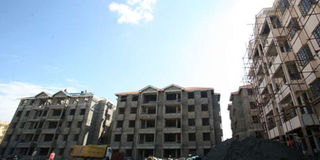Mortgage financing facility will boost affordable housing agenda

This image taken on February 20, 2017 shows construction of Blue Bells Gardens Apartments in Mlolongo, Machakos County. PHOTO | EVANS HABIL | NATION MEDIA GROUP
What you need to know:
- KMRC has the arduous task of resolving the binding constraints that have contributed to low mortgage uptake.
- Improving the housing development ecosystem would have a profound impact on economic growth and social transformation.
The mortgage liquidity facility the government seeks to establish in a bid to promote affordable housing is key to stimulating growth and transformation of the housing development ecosystem.
The Kenya Mortgage Refinance Company (KMRC) is expected to drive the affordable housing pillar of President Uhuru Kenyatta’s ‘Big Four’ agenda through a public-private partnership that has commercial banks, pension funds, savings and credit cooperatives (saccos) and international finance agencies.
This model of raising long-term finance for the primary and secondary mortgage market has helped many countries to scale up the stock of housing for low- and middle-income buyers and tenants.
In the United States, then-President Barack Obama introduced affordable housing programmes that enabled Americans to own homes or live in decent rented housing.
DEFICIT
Mortgage Refinance Company, established on June 2013, mobilises long-term housing development finance to ease Nigeria’s housing deficit of 17 million units while Mortgage Finance Company plays a similar role in Tanzania.
The profile of investors at last week’s briefing by National Treasury Cabinet Secretary Henry Rotich gives a picture of who might partner with KMRC in resolving Kenya’s chronic housing problem.
KMRC has the arduous task of resolving the binding constraints that have contributed to low mortgage uptake.
Commercial banks have only 24,000 mortgages in their books in a market with a deficit of over two million housing units.
The problem lies in the inability of banks to mobilise long-term deposits; hence, they only lend short- to medium-term, in line with the tenor of their deposit portfolio.
INNOVATIVE FINANCING
Mortgage refinance makes long-term finance available, enabling banks and other mortgage lenders to take a longer-term view, usually beyond 20 years — which is ample time for borrowers to repay their loans while enjoying decent shelter.
The innovative financing solution is expected to rapidly scale up affordable housing by stimulating the mortgage market to contribute to the envisaged 500,000 new units in the next five years.
KMRC needs to draw lessons from countries that have implemented the mortgage liquidity model and also global studies on challenges and opportunities of providing affordable and sustainable housing finance.
Innovative financing of affordable housing will be a key agenda at the eighth Global Housing Finance Conference hosted by the World Bank on May 30-June 1 in Washington, DC.
CHALLENGES
Finance is the most critical catalyst for affordable housing but several other factors and systems need to be addressed.
They include land, a serious impediment to economic development due to its cost, lack of titles in many areas and fraud in transfer of titles.
Digitisation of the land registry to curb fraud and expedite issuance of titles is critical.
Other inhibitors include repressive land policies, urban planning, building regulations and shortage of local technical skills and high cost of construction materials and services.
EMPLOYMENT
Improving the housing development ecosystem would have a profound impact on economic growth and social transformation.
Industry studies indicate that construction of one housing unit creates lots of direct and indirect job opportunities.
In a recent opinion in the Daily Nation, Rakesh Rao, the Crown Paints Group CEO, said building one house creates many jobs.
The government’s target of 100,000 housing units a year can create at least 1.5 million direct jobs and millions more indirectly.
Investing in affordable housing would enable Kenya to better tackle rapid urbanisation and protect the poor from falling deeper into poverty.
Mr Warutere is a director of Mashariki Communications Ltd. [email protected]





